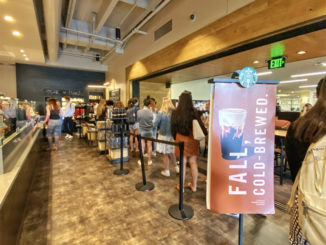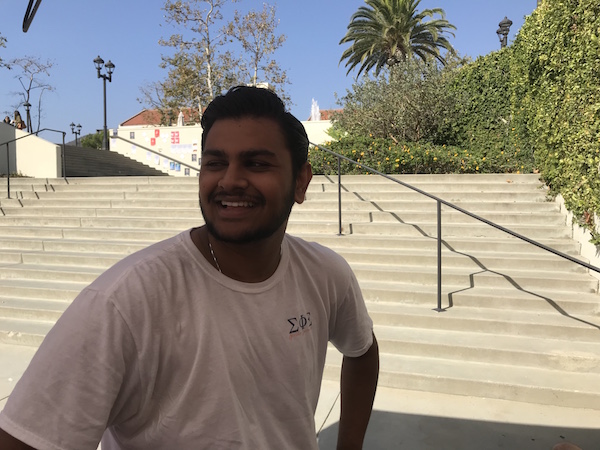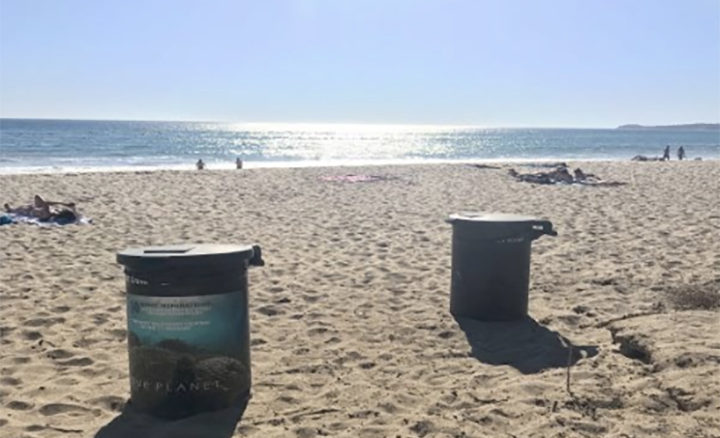
For those living in Malibu, one can expect plastic bans, trendy paper straws or wooden utensils and a fee when requesting a grocery bag.
Malibu city officials have taken steps to create a more sustainable community, banning Styrofoam in 2009 and banning single-use plastics, like cutlery and straws, in 2018. Pepperdine in particular has implemented its own “green” practices, like the reusable Green Boxes and the placement of recycling bins across campus. In addition, many plastic products have been replaced with those made from more environmentally friendly materials like paper and bamboo. But students and faculty say there is more work to be done.
“I think even though the problem is not in our face right now necessarily, we also don’t want it to be in our children’s face at some point,” said Camilla Pupparo, director of Pepperdine’s Center for Sustainability and administration. “So we need to take the small steps now to prevent that from happening in the future.”

A common misconception about waste production and recycling is that the use of paper is better than plastic because of paper’s biodegradable properties, according to allaboutbags.ca.
However, when taking into consideration the durability of plastic as well as the process of obtaining and creating paper products, the detriments of paper may in fact outweigh the detriments of plastic.
In addition to being less durable and creating heavier waste when deposited in landfills, paper production consumes more water and non-renewable energy than plastic production, and it emits more greenhouse and acid gases, according to allaboutbags.ca.
“I know there’s some controversy because some of the plastic substitutes take a little bit more energy to make,” Pupparo said. “So for example, we’re not talking about cutlery anymore but plastic bags and paper bags; paper bags take more energy to be created.”
In addition to being less environmental regarding production, the paper straw requirement drives some students to utilize reusable utensils or no straws at all, according to Channa Steinmetz, a senior Journalism major with a Sustainability minor, and Dylan Anderson, a freshman Business Administration major.
“There are ways around not being able to use [plastic], just like from a drink,” Anderson said. “You don’t necessarily need to use a straw.”

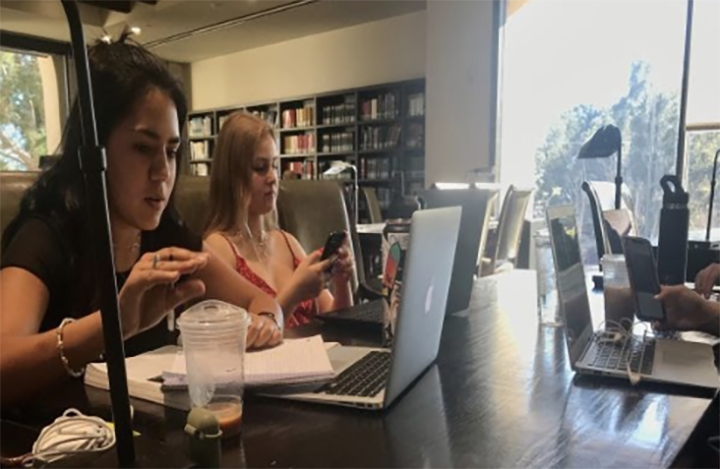
Pepperdine Policy
Although Pepperdine is not required to follow Malibu city ordinances since it is a part of unincorporated Los Angeles County, the university does its best to abide and integrate itself into the community. Thus, it implements the use of the reusable Green Boxes in the Waves Cafe, according to Pupparo.
In addition, Pepperdine utilizes biodegradable to-go boxes, charges a fee for takeout orders and provides wooden utensils at certain events.
Although the Caf still has plastic cutlery, the university is partnered with Sodexo to provide dining services, as it is ultimately up to the company to decide which type of utensils to supply. While Sodexo is internationally known to be sustainability forward, plastics are cheaper to provide, so this is typically what the organization chooses to utilize.
“I think [the utensils in the Caf] are plastic, which I don’t understand because of the plastic ban in Malibu,” Steinmetz said. “I think those should be changed to paper or wooden because if people don’t like them, they can just … grab the metal ones and reuse those.”
As Pepperdine is in the process of evaluating its contract with Sodexo, the university hopes to see changes in the company’s sustainability practices if the contract remains.
All in all, Pupparo said she hopes to see improvements nationwide, as she sees the United States as a major influence on other nations. Pepperdine in particular recently had representatives from a national reserve in Singapore visit campus to learn about investing in reusable to-go boxes similar to the optional green boxes in the Caf.
“We just got pinged by some folks in the wildlife reserves from Singapore,” Pupparo said. “They have these incredible natural parks and natural zoos, all these different things. They found out that Pepperdine uses the green boxes, and they actually came out from Singapore to see them. I was like, ‘I can send you one,’ and they were like, ‘No, no, no, we want to come.’ So they came, and they looked at our practices with the green boxes, and they were really kind of impressed, and they’re wanting to bring that back to Singapore.”
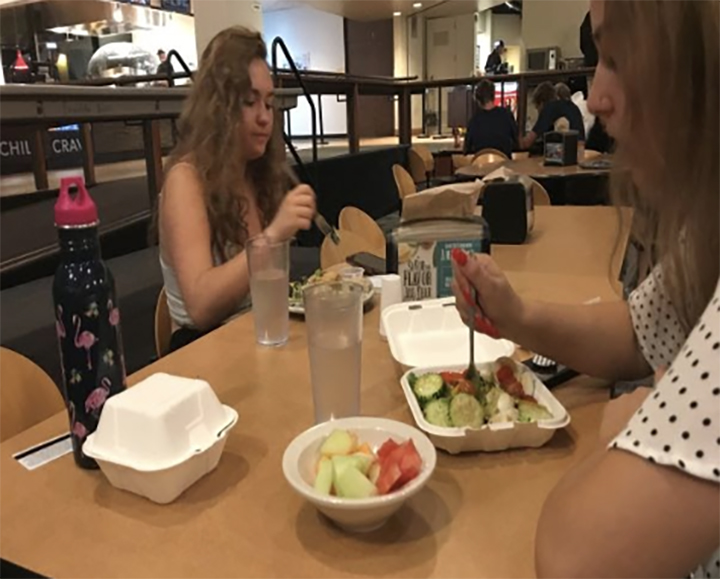
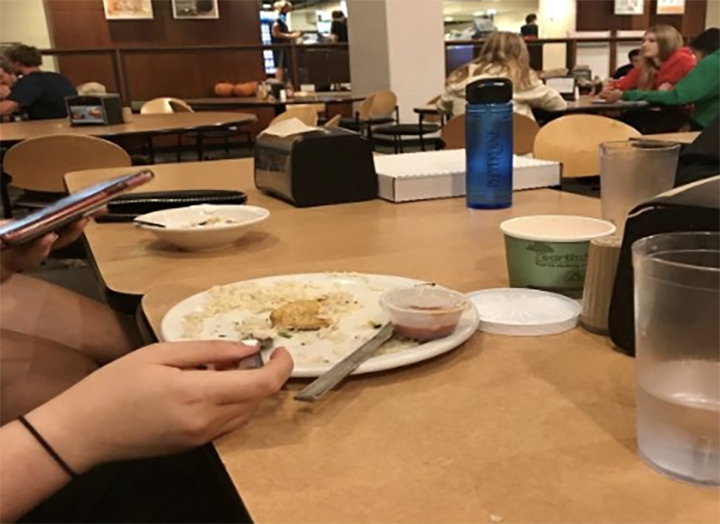
Impact as an Individual
For students wishing to make a greater contribution to the push for sustainability, Pupparo suggests minimalizing straws, utensils and other one-time use products and instead bringing your own reusable items. Students are also encouraged to bring their own reusable to-go containers when ordering at on-campus providers and transfer their food from a plate to their own receptacle if wanting takeout. In addition, placing recyclables and compostables in the correct bins, rather than treating everything as trash, can add to the movement.
Paying closer attention to energy consumption and the foods students eat, — including ordering only locally sourced meat, if any at all — can also aid in reducing one’s impact on the planet, said Chris Doran, religion professor and founder and coordinator of Pepperdine’s sustainability program.
“I think a lot of places look at us as an example, so even though it may be like, ‘Oh well, me recycling isn’t going to make a difference if all of X country isn’t doing it,’ as the world leaders, we need to lead the charge,” Pupparo said. “I do think that it will eventually spread, especially as the problem becomes greater, and I also think we are responsible for helping countries that don’t have these policies and programs in place to develop them.”
A Pepp Post poll of 25 students found that students mostly prefer using paper over plastic and reusables over disposables for takeout food and drinks due to environmental reasons. However, while 76% of students said they are not bothered by plastic alternatives, 68% said they are annoyed with paper straws.
Most students said they not only think that paper is better for the environment but also that they agree with the push toward single-use plastics and would like to see single-use drink bottles banned. When asked which material they believe is better for the environment — paper, plastic or neither — most students chose paper while the remainder chose neither. All students in the poll said they utilize the opportunity to recycle and do not think it is a waste of time, while most students said they believe it is necessary to sort items before placing them in a recycling bin and that they go out of their way to recycle.
Implementation and the Future
Some areas have widespread government support for sustainability practices such as recycling and composting. Canada is one such country, and Gabby Dardano, freshman Business Administration major and Vancouver native, has these practices down in her daily routine. Not only are recycling services entirely government-funded in British Columbia, but citizens freely take part in these sustainable practices.
“In Canada, they’re very open with keeping the environment clean, and it’s become a movement in the past couple of years … and when you buy a house or an apartment, they give you a recycling bin,” Dardano said. “So it’s not like you have to buy one yourself, so everything is provided by the government — recycling, garbage and compost.”
On the other hand, living in less sustainable areas makes it difficult to participate in green practices such as recycling, said Amanda Cooper, junior Creative Writing major. Coming from Ohio, there was somewhat of a transition regarding her sustainable lifestyle. In her hometown, there is a fee for having weekly curbside recycling services. Nevertheless, Cooper said she and her mother were both looking forward to moving to Southern California partly because of the community emphasis on “going green.”
“It was just really cool to see how they take it a lot more seriously here and to kind of get into the mindset of always being mindful about what products we use, where we’re going to be disposing of them and what our environmental impact will be in the long run,” Cooper said.
This is common among Pepperdine students from places unlike Los Angeles in their sustainability practices, said to Samantha Proctor, freshman Creative Writing major and Baltimore native. She says she does her best to live sustainably, but since it is difficult to recycle at home, it is not something she has developed a habit of.
“Recycling is just something we’ve always wanted to do,” Proctor saud. “But we’ve never really gotten the motivation to go the full way there.”
Certain university administrators, such as Doran, recognize this hurdle in achieving a full effect from Pepperdine’s sustainable implementations. He suggests a comprehensive policy across the entire university to obtain more consistency with the “green” practices as well as student education programs that teach about the causes and effects of climate change and the ways students can prevent it.
“There’s plenty of people that come from different states, and most recycling efforts are done at the city or state level, and so some states do it one way and some states do it another way; then people come to LA, and we might do it a completely different way,” Doran said. “So I think Pepperdine would need to really educate students on how we participate in our local environment and what kind of recycling efforts to do to be more sustainable.”
Although Pepperdine is located in Malibu and implements sustainable practices, Steinmetz, Pupparo and Doran all said much work needs to be done in order to create a larger impact on reducing the school’s detrimental effects on the planet. Specifically, Doran said the “amount of shuttles we have running on campus is bizarre,” in regards to fossil fuel consumption and ground smog production. He said the largest change may come about if upper administration, rather than individual offices, of the university decides to act sustainably across campus.
Nevertheless, Pupparo, Doran and Steinmetz all said they remain optimistic that despite the lack of full participation in sustainable practices, this generation of young adults is the change the world is seeking.
“I think the younger generations are, I’m noticing, a lot more caring and passionate about this, which is really encouraging, and it gives me hope,” Pupparo said.
Georgia Zanca completed the reporting for this story under the supervision of Dr. Elizabeth Smith and Dr. Theresa de los Santos in Jour 241 in Fall 2019. Dr. Smith supervised the web story.

